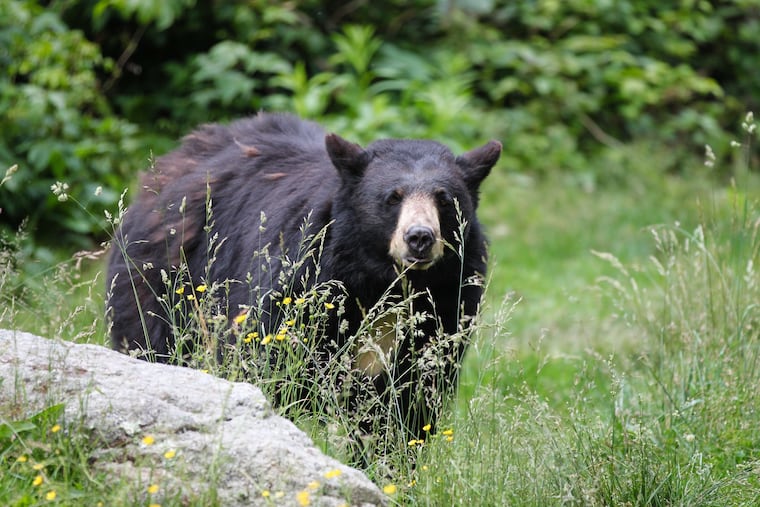New Jersey panel approves controversial black bear hunt for another five years, despite objections
Two one-week hunts are planned this year. State data show a 32% drop in bear activity, including sightings and encounters, in 2023 compared to 2022.

The New Jersey Fish and Game Council approved a bear management plan Wednesday that would allow bear hunting until at least 2028, despite objections of environmental and animals rights organizations who call the harvesting cruel and inhumane.
The plan still needs approval of the state Department of Environmental Protection commissioner Shawn LaTourette, who is expected to sign off.
The council’s chairperson, Frank Virgilio, told attendees of a virtual public hearing that the panel weighed 8,000 public comments when considering adoption of the proposed comprehensive black bear policy for the state. The council says the policy will control the bear population and minimize human encounters, reasoning that opponents dispute.
“If you don’t think that we don’t take this stuff seriously, not only do we take it seriously, but the commissioner’s office takes it seriously; the governor’s office takes it seriously,” Virgilio said.
The all-volunteer, 11 member council is composed by law of six “sportsmen” ― meaning hunters or anglers — three farmers, and two commercial anglers.
The New Jersey Sierra Club, which has long been opposed to the hunt, said hundreds of residents had voiced opposition to the hunt and are asking LaTourette to reject it.
“Today’s decision to extend the black bear hunt in New Jersey is a tragic example of ineffective wildlife management that directly defies the people’s wishes. New Jerseyans do not want this hunt,” New Jersey Sierra Club director Anjuli Ramos-Busot said in a statement immediately after the vote. “Instead, the state should be prioritizing nonlethal management tactics that protect our beloved bears, who are victims of New Jersey’s overdevelopment and conservation crisis.”
DEP data show a 32% drop in bear activity, including sightings and encounters, from Jan. 1 through Aug. 21 of 2023 compared to the same period in 2022.
‘It’s not about murder’
Most of those who spoke publicly Wednesday during the council meeting were against the hunt. One woman noted that deer heads were mounted on a wall behind council member Ken Whildin, suggesting a pro-hunting bias.
However, one man, a hunter identified only as Anthony, said he was in favor of the policy.
“It’s not about just killing. It’s not about murder,” he said, but about long-standing tradition.
Larry Hajna, a spokesman for the DEP, said in an emailed statement that the policy would be formally adopted when published in the New Jersey Register on Oct. 2.
Hajna said the policy contains both “nonlethal and lethal management actions to ensure the sustainability of the species, provide for public safety, and reduce incidences of bear-human conflicts.”
Hunting season
After Sept. 8, the DEP will implement black bear hunting over two one-week segments, one in October and the other in December, in designated zones in some or all of Bergen, Hunterdon, Mercer, Morris, Passaic, Somerset, and Sussex Counties. The policy prohibits killing cubs less than 75 pounds and adult bears accompanying those cubs. It prohibits hunting within 300 feet of a baited area.
Opponents of the hunt say the DEP’s own data show that not only are bear complaints down, but so, too, is the number of bears, now estimated about 1,600, far below historical numbers of more than 3,000.
“This is absolutely absurd,” said Janet Pisar, a member of the Coalition for Animals and the Humane Society. “You have no science to justify that an increased bear population is a bigger threat, a more critical threat to the public. There is no science, and you are compelled to manage game animals by bona fide science.”
Taylor McFarland, the conservation program manager for the state’s Sierra Club chapter, said the council should be moving forward with “an effective nonlethal care management plan” that accounts for development encroaching on what has traditionally been bear habitat.
Jeff Tittel, the chapter’s former executive director, said after that the vote that Gov. Phil Murphy came out against the hunt in his initial campaign for governor. He said supporters feel betrayed not only by the bear hunt, but a host of other environmental issues they felt were neglected.
“We’re telling people Murphy is a bear killer and that in the next election, they shouldn’t elect Democrats,” Tittel said. “We’re telling them to write in Yogi Bear. We’re tired of this. We’re going to hold them accountable.”